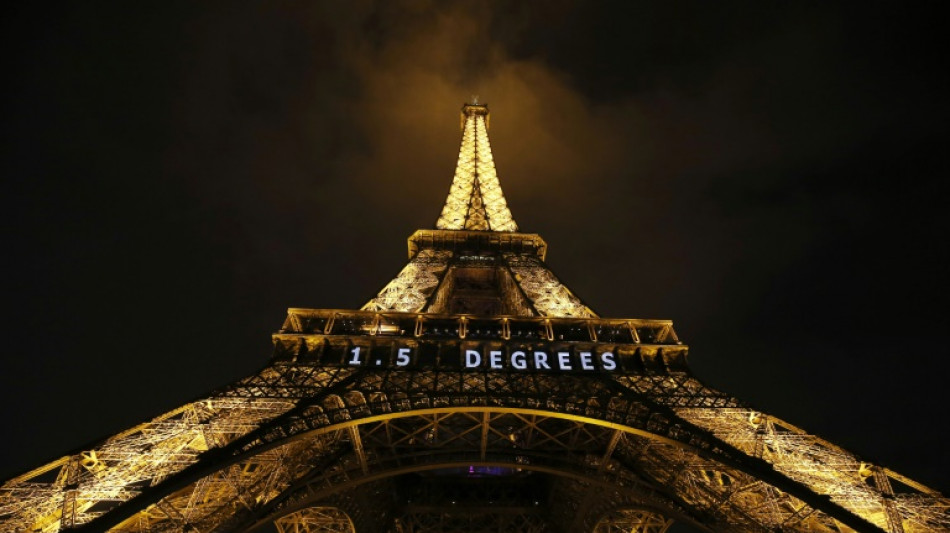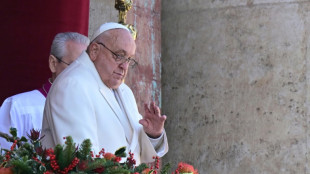
-
 India readies for 400 million pilgrims at mammoth festival
India readies for 400 million pilgrims at mammoth festival
-
Nepal hosts hot air balloon festival

-
 Asia stocks up as 'Santa Rally' persists
Asia stocks up as 'Santa Rally' persists
-
Tears, prayers as Asia mourns tsunami dead 20 years on

-
 Sydney-Hobart yacht crews set off on gale-threatened race
Sydney-Hobart yacht crews set off on gale-threatened race
-
Key public service makes quiet return in Gaza

-
 Fearless Konstas slams 60 as Australia take upper hand against India
Fearless Konstas slams 60 as Australia take upper hand against India
-
Bridges outduels Wembanyama, Celtics lose again

-
 Hungry Sabalenka ready for more Slam success
Hungry Sabalenka ready for more Slam success
-
Mass jailbreak in Mozambique amid post-election unrest

-
 Azerbaijani jet crashes in Kazakhstan, killing 38
Azerbaijani jet crashes in Kazakhstan, killing 38
-
Bridges outduels Wembanyama as Knicks beat Spurs

-
 2004 Indian Ocean tsunami: what to know 20 years on
2004 Indian Ocean tsunami: what to know 20 years on
-
Asia to mourn tsunami dead with ceremonies 20 years on

-
 Syrians protest after video of attack on Alawite shrine
Syrians protest after video of attack on Alawite shrine
-
Russian state owner says cargo ship blast was 'terrorist attack'

-
 38 dead as Azerbaijani jet crashes in Kazakhstan
38 dead as Azerbaijani jet crashes in Kazakhstan
-
Crisis-hit Valencia hire West Brom's Corberan as new boss

-
 Suriname ex-dictator and fugitive Desi Bouterse dead at 79
Suriname ex-dictator and fugitive Desi Bouterse dead at 79
-
35 feared dead as Azerbaijani jet crashes in Kazakhstan

-
 Pope calls for 'arms to be silenced' in Christmas appeal
Pope calls for 'arms to be silenced' in Christmas appeal
-
Syria authorities say torched 1 million captagon pills

-
 Pope calls for 'arms to be silenced' across world
Pope calls for 'arms to be silenced' across world
-
32 survivors as Azerbaijani jet crashes in Kazakhstan

-
 Pakistan air strikes kill 46 in Afghanistan, Kabul says
Pakistan air strikes kill 46 in Afghanistan, Kabul says
-
Liverpool host Foxes, Arsenal prepare for life without Saka

-
 Japan FM raises 'serious concerns' over China military buildup
Japan FM raises 'serious concerns' over China military buildup
-
Pope's sombre message in Christmas under shadow of war

-
 Zelensky condemns Russian 'inhumane' Christmas attack on energy grid
Zelensky condemns Russian 'inhumane' Christmas attack on energy grid
-
Sweeping Vietnam internet law comes into force

-
 Pope kicks off Christmas under shadow of war
Pope kicks off Christmas under shadow of war
-
Catholics hold muted Christmas mass in Indonesia's Sharia stronghold

-
 Japan's top diplomat in China to address 'challenges'
Japan's top diplomat in China to address 'challenges'
-
Thousands attend Christmas charity dinner in Buenos Aires

-
 Demand for Japanese content booms post 'Shogun'
Demand for Japanese content booms post 'Shogun'
-
As India's Bollywood shifts, stars and snappers click

-
 Mystery drones won't interfere with Santa's work: US tracker
Mystery drones won't interfere with Santa's work: US tracker
-
Djokovic eyes more Slam glory as Swiatek returns under doping cloud

-
 Australia's in-form Head confirmed fit for Boxing Day Test
Australia's in-form Head confirmed fit for Boxing Day Test
-
Brazilian midfielder Oscar returns to Sao Paulo

-
 'Wemby' and 'Ant-Man' to make NBA Christmas debuts
'Wemby' and 'Ant-Man' to make NBA Christmas debuts
-
US agency focused on foreign disinformation shuts down

-
 On Christmas Eve, Pope Francis launches holy Jubilee year
On Christmas Eve, Pope Francis launches holy Jubilee year
-
'Like a dream': AFP photographer's return to Syria

-
 Chiefs seek top seed in holiday test for playoff-bound NFL teams
Chiefs seek top seed in holiday test for playoff-bound NFL teams
-
Panamanians protest 'public enemy' Trump's canal threat

-
 Cyclone death toll in Mayotte rises to 39
Cyclone death toll in Mayotte rises to 39
-
Ecuador vice president says Noboa seeking her 'banishment'

-
 Leicester boss Van Nistelrooy aware of 'bigger picture' as Liverpool await
Leicester boss Van Nistelrooy aware of 'bigger picture' as Liverpool await
-
Syria authorities say armed groups have agreed to disband


Dreaming the impossible dream: the 1.5C climate target
In the realm of climate diplomacy, it's the little engine that could, the 80-to-1-odds Kentucky Derby winner, the low-budget multiverse fantasy that came out of nowhere to sweep the Oscars.
We are talking, of course, about the Paris Agreement goal of capping Earth's average surface temperature at 1.5 degrees Celsius above levels in the late 19th century, when burning fossil fuels began to seriously heat up the planet.
At barely 1.2C above that threshold, the world today has already seen a crescendo of deadly and destructive extreme weather.
Fifteen years ago, a 1.5C limit on global warming -- championed by small island nations worried about sea level rise -- was rejected by most scientists as unrealistic and by most countries as unnecessary.
A 2C "guardrail" was assumed to be safe enough.
Today, the 1.5C target is enshrined in everything, everywhere, all at once. While technically no more than an "aspirational" goal, it has become the de facto North Star for UN climate talks, national climate plans and the business world.
From Apple and Facebook to Big Pharma and even Big Oil, multinationals have unveiled promises and plans to be "1.5C-aligned", even if most of those plans don't hold up very well under scrutiny.
You can draw a straight line from 1.5C to the science-base imperative to nearly halve global emissions by 2030 and achieve net zero around mid-century, meaning any residual carbon pollution must be offset by removals.
Both of these targets are set to be affirmed in a report summarising six years of climate science, released Monday by the UN's Intergovernmental Panel on Climate Change (IPCC).
- 2C not good enough -
This raises a perplexing question, according to Beatrice Cointe, a sociologist at France's National Centre for Scientific Research and co-author of a recent study on the history of the 1.5C target.
"How did an almost impossible target become the point of reference for climate action?" she asked.
And what will happen when the world experiences its first full year at or above 1.5C, which the IPCC says could easily happen within a decade, even under aggressive emissions reduction scenarios?
"The target appears increasingly unattainable," Cointe and co-author Helene Guillemot, a historian of science at the Centre Alexandre-Koyre, wrote in the journal WIREs Climate Change.
"And yet calls to 'Keep 1.5C Alive' have been growing louder."
The backstory of the 1.5C goal reveals an interplay of science and politics, with one driving and shaping the other.
Going into the 2015 climate negotiations that yielded the breakthrough Paris treaty, it seemed unlikely that 195 nations would significantly improve on the 2C target already set in stone.
But a scientific evaluation by a UN technical body delivered ahead of the December summit sounded an alarm about the dangers of a +2C world and suggested greater ambition might be wise.
"While science on the 1.5C limit is less robust, efforts should be made to push the defence line as low as possible," it concluded.
A growing coalition of developing nations, meanwhile, had gathered behind the 1.5C goal, eventually joined by the European Union and the United States.
Emerging giants and oil exporters baulked, fearful of the constraints on their fossil-fuel dependent economies.
"China was against it, India was against it, Saudi Arabia fought us tooth-and-nail to the very end," recalled Saleemul Huq, director of the International Centre for Climate Change and Development in Dhaka.
Even today, these nations remain lukewarm on the idea.
But in the end, nearly 200 nations committed to cap warming at "well below 2C", while "pursuing effort to limit the temperature increase to 1.5C."
- 'A moral target' -
It was a stunning diplomatic coup. Many scientists, however, were less than thrilled.
"It will be very hard -- if not impossible -- to keep warming below 1.5 C during the entire 21st century," Joeri Rogelj, a climate modeller currently at Imperial College London who played a key role in the technical report, told AFP at the time.
But because the target was part of the Paris Agreement, nations called on the IPCC -- which exists to brief policymakers on climate science -- for a "special report".
The resulting bombshell, delivered in October 2018, left no doubt as to the difference a half-a-degree makes: a 1.5C world will see deep change but remain liveable; a 2C world could tip the climate system into overdrive, outstripping our capacity to adapt, it warned.
Today, the IPCC -- including Rogelj, a lead author of the 2018 report -- insists that the 1.5C goal is technically feasible.
But that conclusion hangs by the thinnest of threads.
There is no scenario that avoids "overshooting" the target, and bringing temperatures back under the wire will require extracting billions of tonnes of CO2 from thin air, something we can't do yet at scale.
But whether the 1.5C target is feasible may be missing the point, say others.
"Getting 1.5 C into the agreement was a moral target," Huq told AFP not long after the Paris pact was inked.
"It's our leverage, the whip we will use to hit everybody on the back so they can go faster," he added.
"Whether we achieve it or not is going down a dark track. From now on, it's about raising ambition."
Piers Forster, director of the University of Leeds Priestley International Centre for Climate and a coordinating lead author for the IPCC, describes the 1.5C objective as a "huge, but not impossible, task".
"Hopefully the IPCC report can push the urgency," he told AFP. "If it's ignored, we would have to give up on 1.5C."
D.Kaufman--AMWN



